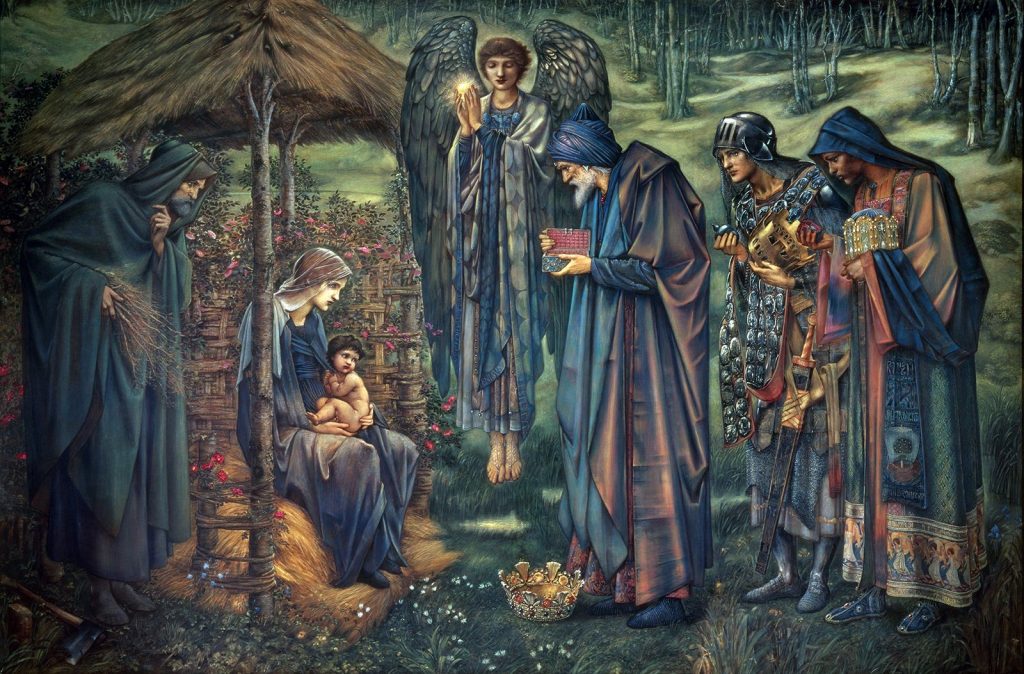Churches around the world will gather, from soaring cathedrals to tiny chapels to war-torn ruins, to celebrate Christmas. What each of these congregations emphasizes about the story of the Christ child will vary, but they will be united in one thing: his miraculous birth to a virgin named Mary. But how did such a story become central to the Christian faith? Did it arise from the mistranslation of a single Hebrew word (Almah) by a Greek scribe?
The fact of Mary’s virginity is highlighted in both the Gospels of Matthew and of Luke. But it is Matthew who evokes Scripture to bolster his claim. In the first chapter of his Gospel, Matthew cites the Prophet Isaiah saying, “Look, the virgin shall conceive and bear a son, and they shall name him Emmanuel,” which means “God is with us.” Well, there you have it. Christians believe in the virgin birth because the Prophet Isaiah predicted it.
But things are not so simple. Matthew cites a Greek translation of Isaiah’s Hebrew composition. The Hebrew original almah doesn’t require the translation “virgin.” It normally refers to a woman of childbearing age who may or may not be married. If she is married but has not yet been with child, she is an almah.
The Greek translation of the Hebrew Bible uses the word parthenos, which can refer to an unmarried woman and, given the ancient context, probably a virgin. That does not solve the problem because Isaiah’s original narrative doesn’t suggest the conception of a child without two parents having sex.
When Isaiah made his prophecy, in the eighth century before Christ, the Israelite kingdom of Judah was under pressure to make a military pact with its neighbors Israel and Syria against Assyria, which was threatening to take over the entire region. (An Assyrian attack would eventually come to pass, in 722 B.C.E., and the 10 northern tribes of Israel would be destroyed.)
Your tax-deductible gift helps our journalists report the truth and hold Christian leaders and organizations accountable. Give a gift of $30 or more to The Roys Report this month, and you will receive a copy of “Hurt and Healed by the Church” by Ryan George. To donate, click here.
With Syria and Israel knocking at the door themselves, though, Judah’s King Ahaz wondered whether an alliance with Assyria would be a better bet. The dilemma in Isaiah, then, is as old as time itself: Which strong man should a weaker country choose as an ally?
Isaiah stepped in to suggest that Judah choose neither, and instead place its faith in God. To encourage a faltering king, Isaiah invites him to ask for a sign of God’s favor.
Ahaz refuses the offer, since a miracle would obligate him to put his trust in God’s provision. He would rather be free to do what he wants. But God would be not so easily pushed aside, and according to the prophet, he offers one anyway: A “young woman” of childbearing age will give birth to a son. Presumably, this woman was already married, but not yet pregnant. If she was an unmarried virgin, then the prophecy was that she will marry soon, have sex with her husband and conceive a child. Either way: No virgin birth as we understand it.
Instead, the significance of this birth, as foretold by Isaiah, is that before that son comes of age, the military threat to the nation will be removed. The irony here is that, amid the looming threat of invasion and realpolitik maneuvering to secure Judah’s future, the sign of God’s power is something as ordinary as the birth of a child.
What good could a child do against an army? That’s the point. God doesn’t need a human army and Ahaz would be a fool to trust in one. The child represents the fact that there was a future for Judea in which the child would live, laugh and play. If there was a future for the child, there was a future for the people. Births always contain an element of hope, the possibility that the child’s life will be more prosperous than the parents’.
As far as we can tell, this child was born and the threat to Judah fell away, just as the prophet predicted. In the coming centuries, no Jewish interpreters read Isaiah’s prophecy as a prediction of the miraculous birth of the Messiah to a virgin.
Matthew and the early Christians weren’t trying to score exegetical points against opponents by citing Isaiah 7:14. He didn’t find it necessary to name the child “Jesus Emmanuel Christ.”
More pointedly, they probably didn’t invent Jesus’ birth of a virgin to fulfill a messianic prophecy of a virgin birth, which no ancient Israelite was looking for. In other words, it seems that Matthew thought that Mary was not simply an almah — a woman of childbearing age — but an actual virgin. The birth of her child would not simply be a sign of God’s presence, but God himself in the form of a child.
The story of Jesus’ miraculous birth seems to have existed apart from Isaiah’s prophecy, and Matthew turned to Isaiah’s “Emmanuel” prophecy in an attempt to make sense of this strange turn of events. But maybe there was more to this passage than a single word that drew his attention.
Matthew can’t have missed the parallel between the military invasion Isaiah’s Judeans were facing and Rome’s occupation of Judea. He could not be unaware that people of his day were in need of a sign of God’s continued care when all outward signs suggested that the coming years would be as depressing as the ones that preceded them. Even more so than in Isaiah’s desperate situation, the sign is not a show of force, but the supreme revelation of divine humility: the incarnation.
This Christmas story is a challenge to certain muscular forms of Christianity that suggest we need political or physical might to overcome our enemies. It rebukes modern strongmen who believe that they can bend history to their will through strength of arms. It gives lie to the claim that Christians must adopt the pugilistic posture of a society at war with itself to accomplish God’s purposes.
If the Christmas story reveals anything, it shows that God chose weakness and vulnerability as a means of calming the fears of a troubled world. That same weakness reappeared during the crucifixion when Jesus chose to love his enemies to the end rather than take vengeance upon them. Christmas, and Christ, is the antithesis of that retributive way of carrying on and is pacifist at its core.
This Christmas, the faithful will not celebrate a miracle whose validity hangs upon a single Greek or Hebrew word. If they attend to the story well, they will celebrate the virgin birth as a revelation of how God visits his people. In a world drunk on power and vitriol, maybe the way Christians can gain a hearing is not through shouting ever more loudly, but though the alluring babble of the Christ child.
The views expressed in this commentary, which was originally published by Religion News Service, do not necessarily reflect those of The Roys Report.
 Esau McCaulley is the author of “Reading While Black” and “Lent: The Season of Repentance and Renewal.” He is an associate professor of New Testament at Wheaton College.
Esau McCaulley is the author of “Reading While Black” and “Lent: The Season of Repentance and Renewal.” He is an associate professor of New Testament at Wheaton College.




















5 Responses
“There is no instance where it can be proved that ‘almâ designates a young woman who is not a virgin. The fact of virginity is obvious in Gen 24:43 where ‘almâ is used of one who was being sought as a bride for Isaac.” (R. Laird Harris, et al. Theological Wordbook of the Old Testament, p. 672.)
Just read Luke’s account, there is no confusion on the subject.
I agree that Luke’s account makes it crystal clear that Mary was a virgin.
Wow. A Wheaton College professor thinks he can overturn two millennia of Christian Orthodoxy in order to make a political point.
Actually, I think he’s affirming the orthodox understanding of the virgin birth but saying that it’s not something people were looking for based on a contested translation of Isaiah which they then projected onto Jesus. That’s what he’s getting at with this paragraph:
“More pointedly, they probably didn’t invent Jesus’ birth of a virgin to fulfill a messianic prophecy of a virgin birth, which no ancient Israelite was looking for. In other words, it seems that Matthew thought that Mary was not simply an almah — a woman of childbearing age — but an actual virgin. The birth of her child would not simply be a sign of God’s presence, but God himself in the form of a child.”
He’s countering the idea that Jewish scholars at the time of Jesus were looking for the fulfillment of the Isaiah prophecy and so projected their hopes for that prophecy onto Jesus. Instead, he’s saying the story of the virgin birth arose independently of any prior expectations of the people of that time. That means that it arose because it actually happened and that it tells us something about God and how he operates.
That’s what I see him saying.